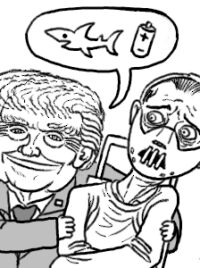Essays
Senator Elizabeth Warren has offered up a proposal for wealth taxation – three percent per year on fortunes over a billion, two percent on fifty million and up, with in-kind equivalents for the owners of private companies, so that Bloomberg and the Kochs would simply hand over shares in their firms which the government would…
Read Full Article...In 2015, Nigeria, a country of about 190 million, spent $625 million to conduct federal and local elections. By comparison, India, with a population of 1.2 billion, spent $600 million on its 2015 election, according to figures released by the Electoral Commission of India (ECI).[1] In 2019, the election budget of Nigeria’s Independent Electoral Commission…
Read Full Article...I find to my bemusement that many Americans seem to have strong views on Brexit, which most of them seem to oppose. What was an American friend imagining when he told me, on the day the outcome of the Brexit referendum became known, that I must be proud to be Scottish because a majority of…
Read Full Article...In the period following the invasion of Ukraine, I began monitoring the interventions of what I’m calling the Alt-Left, having been especially struck by the behavior of The Nation, a periodical with which I’d been associated for many years. This account proceeds with some quotations from The Nation, DSA, and several well-known Left intellectuals, along with…
Read Full Article...On my way home from one of the crazy trips I took to DC over the Kavanaugh confirmation battle in the fall of 2018, I wondered about all the years of actions in DC. Our trips to fight wars, presidents, and looming fascism, to try to make democracy work for people. Most of the time,…
Read Full Article...In March of 2022, Florida’s Republican Gov. Ron DeSantis signed into law the controversial “Parental Rights in Education” bill – informally known as the “Don’t Say Gay Bill.” The bill specifically prohibits “classroom instruction by school personnel or third parties on sexual orientation or gender identity…in kindergarten through grade 3 or in a manner that is…
Read Full Article...The undiminished impact of Joyce in world literature, as well as the great critical and commercial popularity of contemporary Irish fiction, can blind us to the fact that the novel has an uneasy place in the Irish literary tradition. For more than a century, Irish fiction has enjoyed popularity and esteem on the world literary…
Read Full Article...
